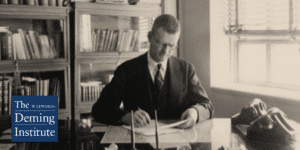Theory of Knowledge
By John Hunter, author of the Curious Cat Management Improvement Blog. One of the four areas of Deming’s management system is “understanding variation.” The core principle underlying that concept is using data to improve while understanding what data is and is not telling you. The mistakes in interpreting data are very often related to mistaking […]
By John Hunter, author of Management Matters: Building Enterprise Capability. Cliff Norman and Ron Moen, of Associates in Process Improvement (API) discuss the history of the Plan Do Study Act (PDSA) Cycle and their research on the subject in the latest Deming Institute podcast (download the podcast). This is the second Deming podcast with Ron […]
By John Hunter, founder of CuriousCat.com. Kevin Cahill’s welcome message to 2015 Deming In Education Conference. Kevin is the Director the The W. Edwards Deming Institute. Kevin talks about the need to break the bounds of common sense practices. Without change we continue to get the results we have always achieved. To improve we need […]
By John Hunter, author of the Curious Cat Management Improvement Blog (since 2004). It is very common for people to see their situation as special and so different that they can only learn about management from some situation identical to the one they face. But this is a misunderstanding of what learning about better management […]
By John Hunter, author of the Curious Cat Management Improvement Blog. Presentation by Ed Chaplin MD at our 2015 Deming Institute annual conference – It Takes An Enterprise: Current Neuroscience and Knowledge of Psychology This is really a great talk that does a great job of illustrating the importance of understanding how our brains work […]
By John Hunter, author of Management Matters: Building Enterprise Capability. Theory of knowledge, how we know what we know, is an area that is difficult for most people to understand and see the value of. But it is very powerful and impacts and interacts with all the other aspects of the Deming management system (psychology, […]
By John Hunter, author of the Curious Cat Management Improvement Blog. Keith Sparkjoy – Discovering Deming: Cultural Evolution at Pluralsight from The W. Edwards Deming Institute 2014 Annual Conference. Enjoy Keith Sparkjoy’s presentation at the 2014 W. Edwards Deming Institute conference – Discovering Deming: Cultural Evolution at Pluralsight using the webcast above. Once you understand […]
By John Hunter, founder of CuriousCat.com. Managers must make decisions when data is unavailable or even impossible to collect. A simple example is training. The only immediate evidence is its cost, expense. The effect of training will not be realized for months or even years in the future. Moreover, the effect can not be measured. […]
By John Hunter, author of the Curious Cat Management Improvement Blog (since 2004). One of the four cornerstones of Dr. Deming’s management system is an understanding of psychology. Dr. Deming continued to learn and adapt based on the latest research and what to continually improve his ideas on management. To stay true to his vision, […]
By John Hunter, author of the Curious Cat Management Improvement Blog. The Red Bead Experiment is an activity Dr. Deming included in his 4 day seminars. The webcast shows excerpts of Dr. Deming carry out the Red Bead Experiment with participants from the audience. Dr. Deming used the Red Bead Experiment to clearly and dramatically […]
- « Previous
- 1
- 2
- 3
- 4
- Next »




